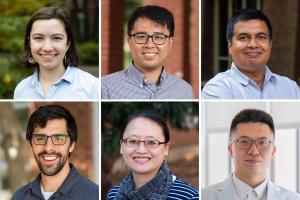
Six early-career faculty at the University of Virginia School of Engineering and Applied Science have earned National Science Foundation CAREER Awards — among the highest honors for young faculty in science and engineering. Their work tackles urgent societal needs: from safer artificial intelligence and more reliable cloud infrastructure to clean water, life-saving medicines and human-centered robotics.
Camille Bilodeau, Assistant Professor, Department of Chemical Engineering
Improving health, clean energy and water access through smarter material design
Bilodeau is using artificial intelligence to help design peptides — tiny chains of amino acids — for use in water filtration, organ grafts and drug delivery. Her CAREER Award supports the development of PepMNet, a machine learning model that identifies high-performing molecules from trillions of possibilities. Her lab collaborates with BioRad to improve purification of protein-based drugs. Students in her classes and lab learn how AI and molecular simulation combine to solve high-impact challenges in medicine, manufacturing and sustainability. Read more.
Tariq Iqbal, Assistant Professor, Departments of Systems and Information Engineering and Computer Science
Enabling robots to support people through adaptable, long-term collaboration
Iqbal’s CAREER Award supports the development of intelligent robots that adapt to human behavior — understanding not just commands but also intent. His algorithms help robots interpret speech, gesture and gaze even as people change how they communicate. That adaptability is critical for supporting aging adults, workers or families over time. His work could lead to robotic assistants in homes, warehouses or hospitals that are intuitive and reliable. He also incorporates machine learning advancements into teaching and creates research opportunities for students at all levels. Read more.
Yen-Ling Kuo, Assistant Professor and Anita Jones Faculty Fellow, Department of Computer Science
Advancing social intelligence in AI to foster trust and cooperation
Kuo’s CAREER Award supports her research at the intersection of AI and cognitive science, focused on giving robots “theory of mind” — the ability to infer human goals, beliefs and intentions. She is building systems that interpret speech, body language and context to make human-robot collaboration more natural and effective. This work could improve robotics in healthcare, homes and workplaces. Based in the Link Lab, Kuo integrates her research into hands-on student experiences and helps shape the future of socially aware AI through mentorship and interdisciplinary collaboration. Read more.
Chang Lou, Assistant Professor, Department of Computer Science
Protecting essential services by making cloud systems more resilient
Lou’s CAREER Award supports the creation of automated tools to detect, diagnose and prevent “silent failures” — hidden bugs that can disrupt cloud systems without warning. His research embeds failure-checking mechanisms directly into the development process, making infrastructure more robust and secure. The work has potential to safeguard financial services, healthcare platforms and emergency systems. Collaborations with Microsoft and Amazon are helping bring his methods into high-impact industry environments. Read more.
Nicholas Vecchiarello, Assistant Professor, Department of Chemical Engineering
Reducing the cost of medicine through better drug purification materials
Vecchiarello’s CAREER Award funds research into peptide-coated surfaces that improve purification of protein-based drugs by removing unwanted impurities during production. His team uses high-throughput screening and modeling to identify optimal materials, reducing waste and cost while improving patient safety. This could increase access to treatments for cancer, diabetes and other chronic illnesses. The award also supports student training and collaborative research with Camille Bilodeau to advance UVA’s leadership in bioseparations science. Read more.
Shangtong Zhang, Alf Weaver Assistant Professor, Department of Computer Science
Making AI agents safer, faster to evaluate, and more aligned with human goals
Zhang’s CAREER Award supports development of new methods to evaluate AI agents without risky or expensive real-time testing. By combining offline data with targeted online experiments, his research improves safety, speed and understanding of agent behavior in high-stakes applications like healthcare, robotics and autonomous systems. His work reduces failure risks and accelerates progress while opening pathways for broader participation in AI development. Zhang also mentors students to design agents that are transparent, trustworthy and aligned with human values. Read more.